Warning, major spoilers for Jessica Jones Season Two ahead! Like literally all the spoilers.
Jessica Jones is back! After two and a half years of only getting to share her in The Defenders, we finally get her back on her very own show for a second season of the Marvel series. As gritty as ever, Season Two counted 13 episodes, with 13 female directors, and a majority female writing staff. I went to a Jessica Jones panel at Paleyfest the day Season Two dropped on Netflix, and one of my favorite moments was when showrunner/writer/executive producer Melissa Rosenberg was asked about that decision and that process and her answer was basically that it wasn’t very hard. She said she originally set out to have at least half of the episodes directed by women, but when they sat down to look through their options, there were plenty of seasoned, talented directors to choose from, so why not hire them for all 13 episodes?
Another thing I took away from that panel, and something I think is apparent more than ever, is that this show isn’t about women, and it isn’t about superpowers. It’s about a traumatized, alcoholic PI with a heart bigger than she cares to admit, a former child star turned radio host who is desperate to help people and to matter, and a high-powered lawyer who fought her way to the top tooth and nail and is determined to stay there. It just so happens that these three characters are women. It just so happens that one has powers. It just so happens that one is a lesbian. But the sentiment didn’t end there — we’ve heard that all before, right? What really hit home for me is that Rosenberg elaborated that it’s not that it doesn’t MATTER that these characters are women, because being women shaped how they came to see the world, and shapes how they move around in it. Being women — having powers, being a lesbian — DOES help define them. It’s just not the ONLY thing that does.
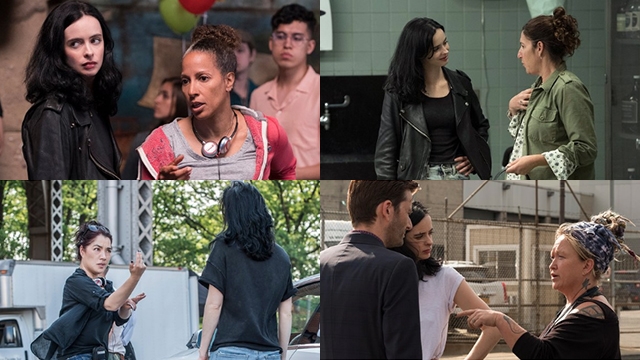
Directors from top left, clockwise: Millicent Shelton (first black women to receive Emmy nomination for best comedy directing), Liz Friedlander (former music video director), Deborah Chow (internationally award-winning short film director), Jennifer Lynch (first women to win best director at New York City Horror Film Festival).
And truly that’s what makes these characters work; none of them are just one thing. They are layered and complicated and very, very flawed — all in ways real people are. And they’re set in a world where unreal things happen.
Before I get into the nitty gritty of this season, I do want to say that I don’t think it was as good as the first season. Don’t get me wrong, I loved the second season, and I think it was cleverly written, well crafted, beautifully acted, and visually stunning. But I don’t think any villain will ever be as scary to me as Kilgrave. That said, there were some really great themes and storylines we can unpack together.
When Strong Women Feel Weak
We have Jessica Jones; superhuman strength, highly skilled PI, witty as a whip, loyal as a person can get. Then we have Trish Walker; fierce determination, a passion for making a difference. And Jeri Hogarth. Motivated, smart, knows how to go after what she wants, takes nobody’s shit. Three very different women with very different strengths, but all three are tough and complex, and all three have seen some shit.
This season all three of them are put through the wringer once again. They all are exposed to a chink in their armor and they all lose their damn heads about it.
Jessica meets someone stronger than herself, which already has her on her toes, and then that someone turns out to be her mother. Her MOTHER. Alisa Jones. The one she thought was dead all this time. This one thing that made up so much of who she was for so long was untrue. She wasn’t an orphan after all. Her mother had been alive all these years. Her mother is alive right now. And her mother is a murderer.
When Killgrave had control of Jessica, he left her with more than the trauma of raping and controlling her. He left her with a fear of her own strength. He forced her to kill someone, and then he all but forced her to kill him. Kilgrave made her a murderer twice over, and every time she has to throw a robber across a convenience store or punch a thug square in the face, she’s holding back, she’s thinking of the lives she’s taken with her bare hands. They haunt her.
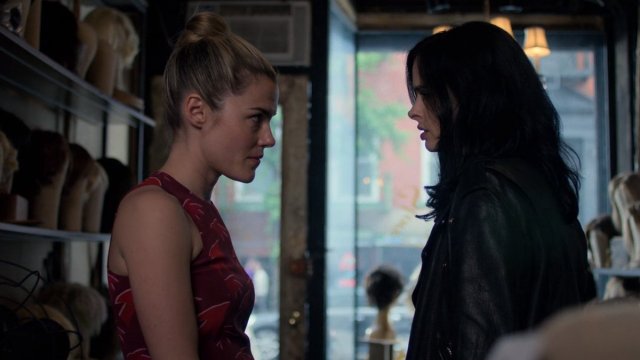
Wanna go home, make some nachos, and watch Carol?
If you asked Jessica Jones to list the people she’s killed, however, those wouldn’t be the only two people on her list. Murdered, sure, but not killed. Because she also blames herself for the deaths of her parents and her little brother.
So now Jessica’s entire world is flipped upside down; her darkest truths were lies, her biggest fears are coming true before her eyes. Her mother never died, her mother has the same powers she does, and her mother is using those same powers to commit vicious murders.
Jessica’s voiceover at different points over the season laments this turn of events, saying she’d always wished to have her mother back. But as she has to chain her mother to the bed to sleep at night, as she has to talk her mother out of blackout rages, as she has to beg her mother not to actively and purposefully murder her best friend, she realizes that maybe this dream she had been holding onto for over a decade isn’t what she wanted after all. As the dream cloud rises, more truths are revealed; she was experimented on after the car accident, her parents were near divorce at the time of the accident and her little brother knew it, her mother killed the first boyfriend she ever really loved — whose death she ALSO blamed herself for all these years, because she assumed the gang guys she beat the snot out of killed him. (Side note, this flashback episode might have been my favorite episode of the season, and the origin story of Jessica’s leather jacket was such a nice touch.)
Jessica thought Kilgrave’s death would free her of this type of mindfucking, but unfortunately she was wrong.
This is exacerbated toward the end of the season, when Jessica goes into a prison guard’s house to prove he was abusing and murdering inmates at the women’s prison where he worked, and finds herself being attacked. The man had killed before, and he was shouting “it’s self defense” after pepper spraying her, swinging his weapon at her unarmed, unseeing person. She fought back, her self-defense being far more legitimate, and ended up lodging the tool in the guy’s face fatally by accident.
But poor Jessica can’t trust that it was an accident; was this always bound to happen? Was this wickedness always inside her? One of the most intense parts of this season was in the aftermath of killing this man, Jessica is starting to hyperventilate and eventually quiets the voices in her head long enough to write a suicide note confessing to his crimes and throwing his body off a building. When she calls her mother to tell her that the guard who had been torturing her wouldn’t be a problem anymore, her mother — everything Jessica fears she’ll become — says she’s proud of her. Not long after this, the vision of Kilgrave appears and says he’s proud of her, too. Jessica tries to use her old coping mechanisms to shoo him away but this isn’t the real Kilgrave. This is the aftershock of her trauma. This is the pain and fear she’s been hiding from and ignoring, manifesting as Kilgrave.
Eventually, Jessica realizes the major difference between her and her mother, between her and Kilgrave and she says it to the visage of Kilgrave that has been haunting her: She can control her power, control herself, which means she’s more powerful than he’ll ever be.
While all this is happening to Jessica, Trish is going through her own shit.
Trish’s whole thing this season is that she’s having a hardcore hero complex. Last season showed Trish wanting to encourage Jess to use her powers for good, but this season she’s fed up with just being a moral compass. In fact, she smashes her moral compass to bits and sets off in search of power of her own. At first, just figuratively. She doesn’t have superpowers, but she has her voice. She thought that could be enough. But no one was paying attention to her on Trish Talk when she wasn’t doing fluff pieces, and meanwhile Jessica, in her opinion, was wielding all this power and not doing anything with it. And this is just the straw the breaks the camel’s back as far as feeling like her voice doesn’t matter; she was her mother’s puppet from a young age, and was raped by a producer when she was 15 years old, all but at the request of her mother. The fame has people assuming things about her, or calling her by a name that isn’t hers.
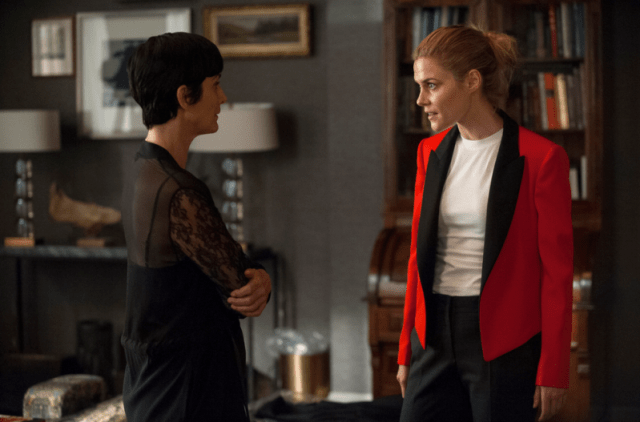
It’s not a circus coat; I’m making a superhero evolution!
This helpless feeling comes to a head when she’s attacked by what was then just thought to be a monster and can’t defend herself. Her ex-boyfriend Simpson is murdered, leaving behind his super-soldier inhaler, which Trish decides to start using, despite: a) almost dying last time she used it b) not knowing exactly what was in it c) being an addict. But she insists to anyone who asks (mostly Malcolm) that it’s not addictive, that it’s not a drug, that it’s the same as going for a run or having a lot of caffeine. Lying to herself, lying to everyone. Because she does get addicted — and maybe it wasn’t a dependency on the chemicals itself (even though the lows are so low I have a feeling that might be part of it) but to the power. She’s stronger, smarter, faster when this stuff is coursing through her veins. Another problem is, now that she has these abilities, she keeps thrusting herself into danger’s path. Jessica sees her doing it and just tries to scold her out of it; though in her defense she has a lot going on, too. What’s worse is, when Trish’s inhaler runs out, she risks her ENTIRE LIFE to try to undergo a similar experiment to the one who gave Jessica (AND HER MOMMY DEAREST) her powers. Jessica realizes then that they’ve been out of sync, but worries it’s too late.
It’s so hard to watch because Jessica and Trish feel so far away from each other, like they’re running in parallel circles, rarely meeting where they should be, but the entire time, throughout the entire season, they’re thinking and talking about each other so much. They’re just so caught up in their own issues they forget to reach out. They’re so busy trying to protect each other they don’t take the time to be with each other. I wanted to sit them down on a coach and be like TALK TO EACH OTHER because in every interaction they had one of them was hiding something from the other or tamping down a feeling they should have expressed. Even when they were working together they were only touching on the important things, brushing them aside, focused on the mission at hand.
(Look, I still ship it and I’m not sorry.)
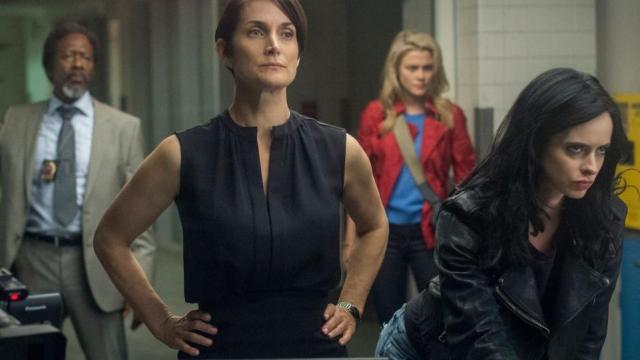
So. You think Matt Smith deserved more money than Claire Foy on The Crown?
While these two are going through all this, Jeri Hogarth has her own parallel story going on. It intersects with Jessica’s story here and there, but hers is largely an internal struggle. She starts the season winning an award, feeling on top of the world, when she’s knocked off her pedestal by the news that she has ALS. This news breaks her. She feels defeated already, she starts putting her affairs in order, starts looking into euthanasia. She doesn’t want to live out the final years of her life, not knowing if it will be two years or ten, she doesn’t want to ever feel physically weak. She’s ready to say her goodbyes to this cruel world when an opportunity arises and she can’t help herself but take it.
Jessica has an ex-nurse named Ines who needs protection, because she knows things about the illegal experiments she’s trying to expose, and asks Jeri for help, for use of a safe-house or something. Jeri sees this opening and takes Ines into her own home, wanting to learn more about these experiments, wanting more of her nurse expertise. Because of this, she isn’t using her usual keen senses, and gets swept up in the promise of being strong again. She kisses Ines’s scars and Ines lets Jeri feel like she’s protecting her, and eventually tells her about a man she knows who can heal people. The red flags are there, but Jeri doesn’t see them; Jeri doesn’t want to see them. A woman who has built her career on truth and lies and knowing the difference fell for this con, and got wiped out because of it. The moment she realizes it, the moment she comes home and finds her place cleaned out… it’s the moment she breaks.
Love Makes a Family
Family is a major theme this season. Jessica has always insisted she had no family. Her parents and brother were dead, the end. Despite Trish calling Jessica her sister all season, Jessica doesn’t return the sentiment. That is, until the turning point in her new relationship with her mother. In fact, two things happen in a short period of time. When Mama Jones is raging, attacking Trish, trying to kill her for bringing attention to the hospital, for setting off this chain of events, and, at the root of it, for being closer to her daughter than she herself is. Usually when her mother got into these rages, only sedatives could stop her, but not this time; this time Jessica stops her with one word: Mom. Not too long after that, Jessica is explaining why she knows they can’t live like this, together, free, why things will never be the same as it was before the accident: Alisa tried to kill her sister. Jessica says it this time, sister.
And this is significant, because as we’ve established, Jess has a hard time letting people in. Poor Malcolm spent the entire season trying to help her and getting himself fired over and over again as a thank you. But being faced with her “real” family and realizing that sharing blood, even sharing a history and memories, didn’t automatically or magically make her love Alisa the way had imagined she would love a mother. Love HER mother. So maybe it’s okay to let other people in, to start considering other people family, even though they aren’t the family she lost. This this is the kernel of hope the season ends on, with Jessica joining Oscar and his son Vito for dinner. Maybe not what she might have considered a “normal” family a few years ago, but a family nonetheless. She’s ready to stop dwelling on the horrible things that have happened to her and focus instead on the future. On living.
Overall, I loved the depth and heart of the season. As promised, the season wasn’t about superpowers or being the Chosen One or saving the city. It was about Jessica Jones and the people in her life, it was about her trauma and her relationships and her trying to figure out who she is and what she wants. It was about strength and power and weakness and fear and love and family. It was about Jessica Jones.
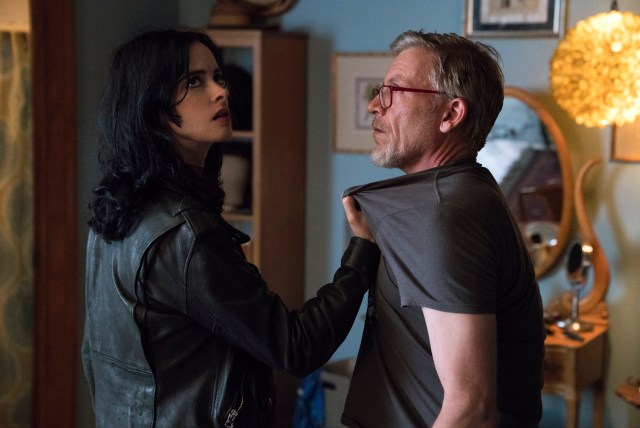
My misandry isn’t ironic.
I enjoyed that the men were all secondary in the plotlines throughout the season. They were all vehicles for a woman’s plot, not the other way around. Trish’s now ex-fiance, Malcolm, Oscar, Pryce, Dr. Malus, None of them had storylines of their own, they were all inextricably tied to one of the main female characters — but the same wasn’t true in the reverse. Proven by the fact that I hardly mentioned any men at all until the end of this review.
Along with Jessica having dinner with Oscar at the end of the season, Trish and Jess have one final blowout. Trish shot Alisa in an attempt to stop her, because in her mind she was inherently dangerous, and was afraid the police wouldn’t be able to differentiate between “good powers” and “bad powers” when they got there. But Jessica didn’t think that was Trish’s decision to make. The last thing Jessica says to Trish is that every time she looks at her, all she sees is the person who killed her mother. My biggest fear for the future of this show is that the break this bond suffered might be irreparable. It was stretched and stressed all season and then it was shattered with a single gunshot. Trish went too far and I’m not sure they can come back from that.
Trish’s kernel of hope, though, was on her way out of Jessica’s apartment building after this fight. She drops her phone and catches it with catlike reflexes. One might even say… Hellcat-like reflexes. (Also earlier a doctor told her she used up two of her nine lives which maybe was ham-handed but guess what I DON’T CARE, I’M EXCITED FOR HELLCAT.)
Jeri, too, ends more hopeful than she was, and instead of researching euthanasia drugs, when we see her last, she’s starting up her own law firm. She, not unlike Jessica, is ready to learn how to live.
I have a few hopes for Season Three — first and foremost that it’s not 2.5 years until it happens (if it happens at all). This show also really needs to add some women of color. We had the additions of Pryce and Oscar (and Vito) this year, and Oscar’s ex briefly, but especially if Trish and Jessica are going to take time to find their way back to each other, a female partner in (hyperbolic) crime would be fun to watch, I think. I’d also like Jeri to have a love interest that isn’t so… tragic. So far we have a dead wife, an ex-mistress who is suing her, and a faux girlfriend who conned her. Jeri’s story ended with some hope — she was even flirting with her yoga teacher — but something solid and stable might be nice.
My main hope, though, is that Jessica Jones will pave the way for more women to write and direct and edit and produce TV shows and movies about women. It makes all the difference in the world when they do.



HELLCAT!!!!!!
But she’s not in highschool anymore.
Yes, this.
I think I said this on a Friday Open Thread, but this season felt like it was going full on “No Homo”. It seemed like the writers responded to last season’s (And the season of “The Defenders”) Trishica, by having the two of them say “My sister” and “My best friend” every five seconds.
Yeah, I’ve noticed that too.
It was almost like Kara and Lena saying they’re friends every time they can to kill Supercorp ship.
finally, my people talk! everywhere (youtube, Facebook…) are hateful comments about Trish. but all I could see is their beautiful relationship which they have. and am I only one who saw Jessica being jealous at Trish’s engagement party?
I saw that, and I’ll raise you a Jess pushing Trish behind her when they’re in the movie studio and Alisa is coming right at them.
Yes and yes . And why Trish got so mad and stormed out when she thought Jess has a guy in her bedroom?
I thought the same thing. It was too on the nose. They never called each other sister during season 1.
Poor secretary Pam, I got a fast reminder of just how cold jeri could be when jeri spouted mysoginist crap about Pam I think in episode one or two. So blessed that we have so much queer content that I can say, you know what? Jeri’s not a nice person and I don’t need this, I’ll watch to see what Jessica is up to. I haven’t finished the rest of the season but killgrave set the bar really high and I was prepared to not enjoy the second season as much. But I love the back story, how alias got to be, the exploration of the mother/daughter relationship.
I will give them all the props for they have setup the third season, there are so many directions this can go and I just really hope that we don’t have to wait two years for it.
I feel like you’re so right on in so much of this (also I live for your supergirl recaps so can’t wait for that to start back up). I do feel like Malcom at the end got a little storyline autonomy which I was cool with (literally love Malcom).
However, I’d like for Malcom to continue working for Jessica please, not that she’s easy to work for, and Jess and Trish to love each other and be close again. Didn’t ship them because I have a sister I’m very close to so that’s like, never an angle that I’m looking for. But I definitely think that they’re both jealous of people who encroach on their bond.
Anyway, love Jessica. Need her and Trish to super connect again but I’m guessing it won’t happen until Trish is able to save Jessica with her powers and Jessica has whiskey while they talk out what is going on with her sister and they walk off into the sunset. Too cheery? Perhaps. Either way, thanks for posting here. It was a great season but no one will scare the way kilgrave scares.
I kinda felt like season 1 was about the danger of masculinity and season 2, weirdly, was about the danger of feminism gone ‘too far’. Like, whenever women trust one another here, it turns out badly. Plus we finish on Jess turning away Trish and heading to a nice normal hetero dinner!
Alisa is a classic, older, more radical feminist. She spends most of the season angrily ranting about her husband and about how stunted she was in her life because of him. She literally gets so ragey at men that she kills them! Any coincidence that she kills her daughter’s boyfriend?
And then Trish’s storyline is about the dangers of women’s masculinity. The inhaler was a symbol of Simpson’s descent into toxic masculinity and it functions in a similar way for Trish. As she goes further into her addiction, she dresses more and more masculinely, no dresses, less makeup, hair tied back more severely. Her desire for ‘powers’ seems to mirror her hatred of her own femininity- a femininity that means she is never taken seriously and a femininity that is blamed for her own rape (she was asking for it with the director, when Jess finds her giving a BJ to the club owner, she says she was trying to ‘be polite’).
I really enjoyed watching the season, but I think it said some disconcerting things about women’s relations with one another and their relationships with feminism? Dunno.
So, IGH consisted of a cylon doctor, a human doctor, 2 nurses, a janitor and a few ex soldiers?
Just finished with S2. There was some heavy soul crushing involved in this season (not that S1 was less soul crushing). Hoping for that happy ending, that dream come true– brutally shot down, for all three women. And then a life line at the end for each of them.
Not sure if I am a fan of this kind of story telling. It leaves you devastated, not relieved that they made it through. And yes, I agree with the above commenter that female relationships were (even more) toxic this season than last. Not sure how Trish and Jessica will ever come back from this.
Janet McTeer was a revelation, a force of (genetically manipulated) nature– Her brutality was always framed as love / protection of somebody else. Quite tough to watch. As you knew, this could never end well.
All these beautifully damaged people paid a high price for the promise of being a hero of their own (making).
Since this article was revived by “Boobs on Your Tube”, I want to give my take on season two.
Season two is all about people trying to retake control in their lives, and the sometimes (in this case all the time) bad decisions we make trying to do it. Jessica trying to retake control is her drinking, looking for the murderer, and in the end helping her mother. Trish (hoo boy, Trish) ends up doing drugs, helping Jessica in her cases, and then forcing Dr. Malus to try and give her powers. Jeri considers suicide, blackmails her partners, blackmails a person for a possible cure, and then manipulates Inez into killing him. And Malcolm helps Jess, sleeps around, then finally joins the rival PI firm. All of it is people feeling victimized and the various ways they try to regain control of their lives.